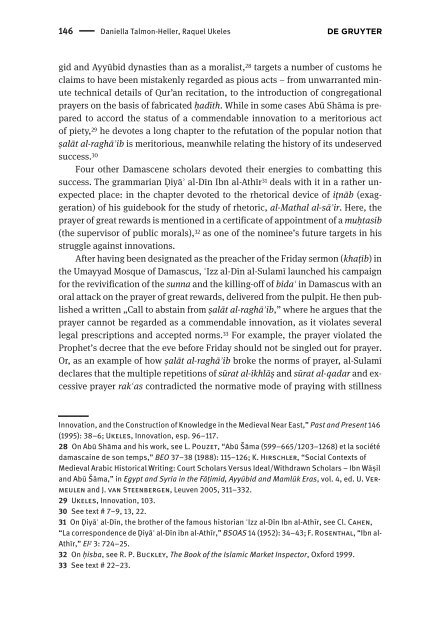0021-1818_islam_98-1-2-i-259
0021-1818_islam_98-1-2-i-259
0021-1818_islam_98-1-2-i-259
You also want an ePaper? Increase the reach of your titles
YUMPU automatically turns print PDFs into web optimized ePapers that Google loves.
146 Daniella Talmon-Heller, Raquel Ukeles<br />
gid and Ayyubid dynasties than as a moralist, 28 targets a number of customs he<br />
claims to have been mistakenly regarded as pious acts – from unwarranted minute<br />
technical details of Qur’an recitation, to the introduction of congregational<br />
prayers on the basis of fabricated hadith. While in some cases Abu Shama is prepared<br />
to accord the status of a commendable innovation to a meritorious act<br />
of piety, 29 he devotes a long chapter to the refutation of the popular notion that<br />
salat al-ragha#ib is meritorious, meanwhile relating the history of its undeserved<br />
success. 30<br />
Four other Damascene scholars devoted their energies to combatting this<br />
success. The grammarian Diya# al-D\n Ibn al-Ath\r 31 deals with it in a rather unexpected<br />
place: in the chapter devoted to the rhetorical device of itnab (exaggeration)<br />
of his guidebook for the study of rhetoric, al-Mathal al-sa#ir. Here, the<br />
prayer of great rewards is mentioned in a certificate of appointment of a muhtasib<br />
(the supervisor of public morals), 32 as one of the nominee’s future targets in his<br />
struggle against innovations.<br />
After having been designated as the preacher of the Friday sermon (khatib) in<br />
the Umayyad Mosque of Damascus, ^Izz al-D\n al-Sulam\ launched his campaign<br />
for the revivification of the sunna and the killing-off of bida^ in Damascus with an<br />
oral attack on the prayer of great rewards, delivered from the pulpit. He then published<br />
a written „Call to abstain from salat al-ragha#ib,” where he argues that the<br />
prayer cannot be regarded as a commendable innovation, as it violates several<br />
legal prescriptions and accepted norms. 33 For example, the prayer violated the<br />
Prophet’s decree that the eve before Friday should not be singled out for prayer.<br />
Or, as an example of how salat al-ragha#ib broke the norms of prayer, al-Sulam\<br />
declares that the multiple repetitions of surat al-ikhlas and surat al-qadar and excessive<br />
prayer rak^as contradicted the normative mode of praying with stillness<br />
Innovation, and the Construction of Knowledge in the Medieval Near East,” Past and Present 146<br />
(1995): 38–6; Ukeles, Innovation, esp. 96–117.<br />
28 On Abu Shama and his work, see L. Pouzet, “Abu Åama (599–665/1203–1268) et la société<br />
damascaine de son temps,” BEO 37–38 (1<strong>98</strong>8): 115–126; K. Hirschler, “Social Contexts of<br />
Medieval Arabic Historical Writing: Court Scholars Versus Ideal/Withdrawn Scholars – Ibn Wasil<br />
and Abu Åama,” in Egypt and Syria in the Fatimid, Ayyubid and Mamluk Eras, vol. 4, ed. U. Vermeulen<br />
and J. van Steenbergen, Leuven 2005, 311–332.<br />
29 Ukeles, Innovation, 103.<br />
30 See text # 7–9, 13, 22.<br />
31 On Diya# al-D\n, the brother of the famous historian ^Izz al-D\n Ibn al-Ath\r, see Cl. Cahen,<br />
“La correspondence de Diya# al-D\n ibn al-Ath\r,” BSOAS 14 (1952): 34–43; F. Rosenthal, “Ibn al-<br />
Ath\r,” EI 2 3: 724–25.<br />
32 On hisba, see R. P. Buckley, The Book of the Islamic Market Inspector, Oxford 1999.<br />
33 See text # 22–23.


